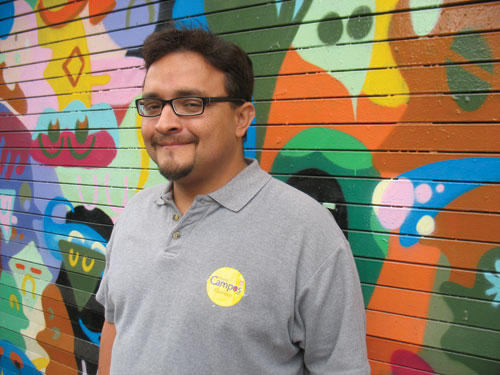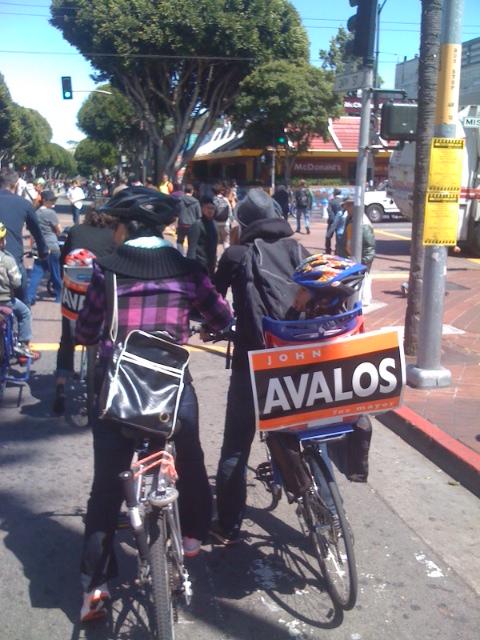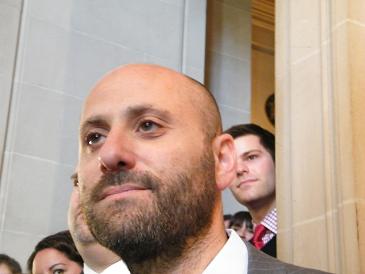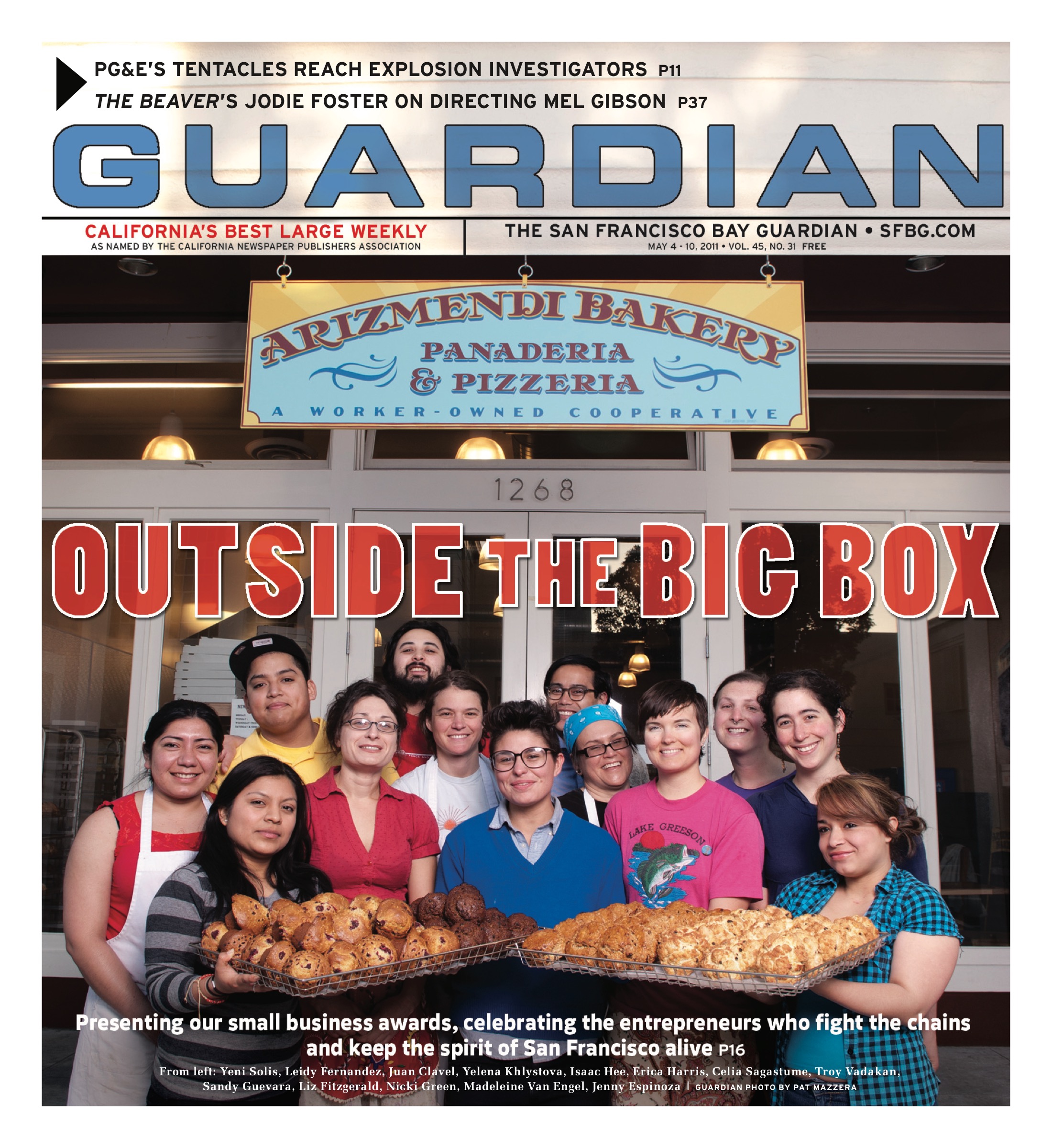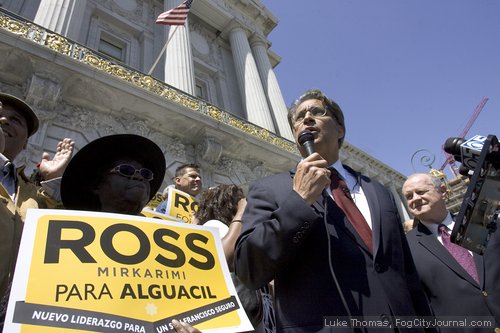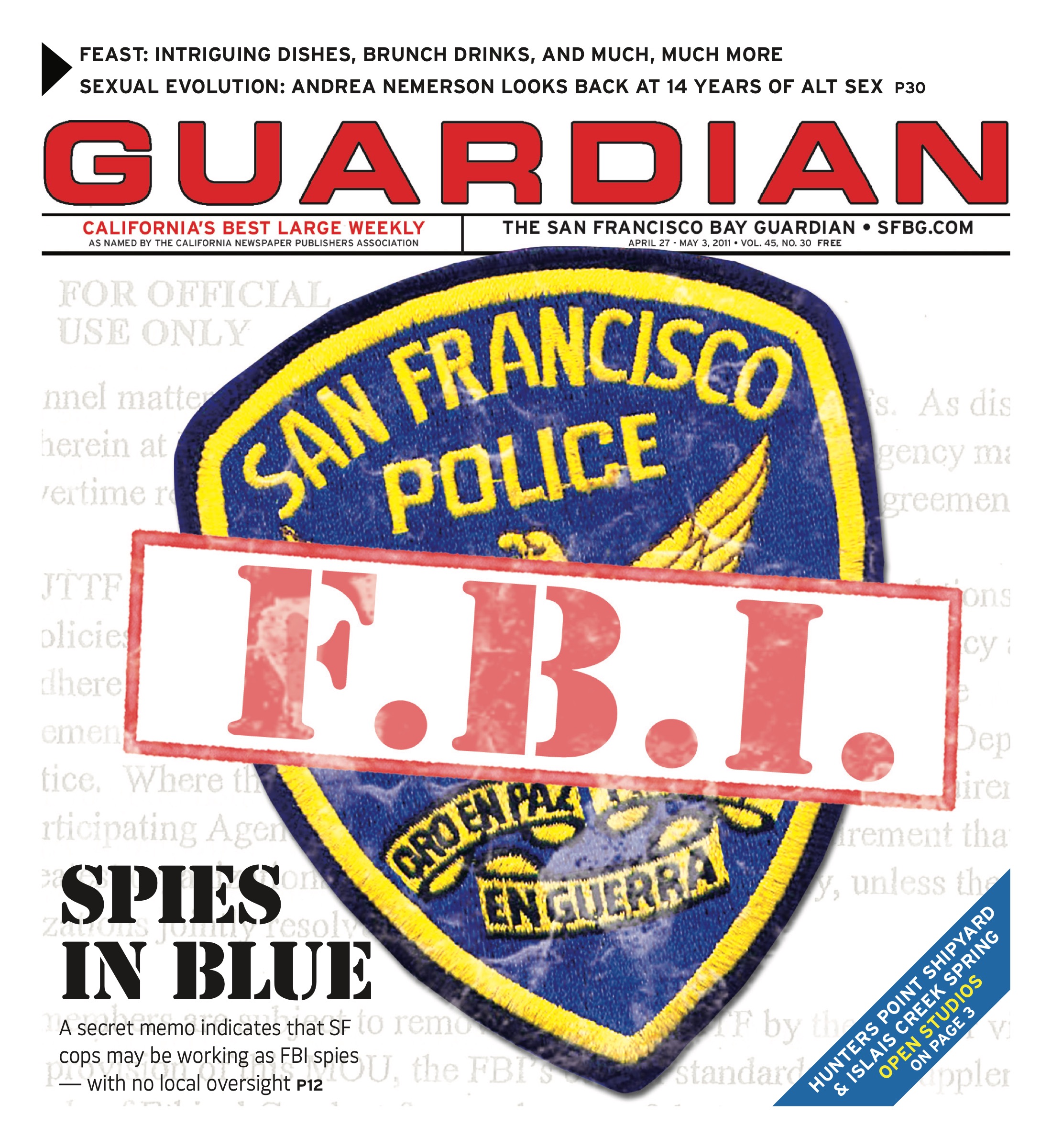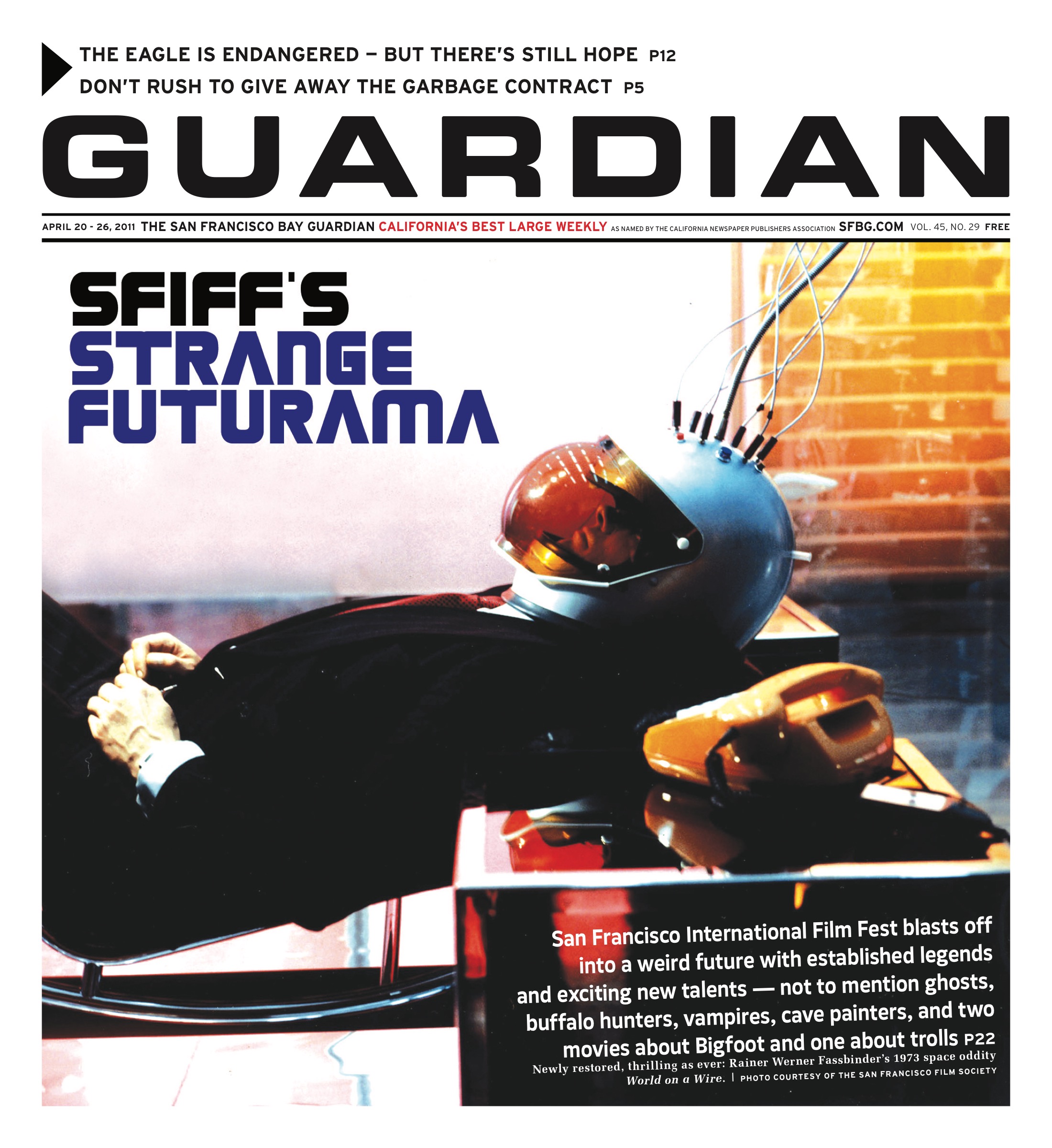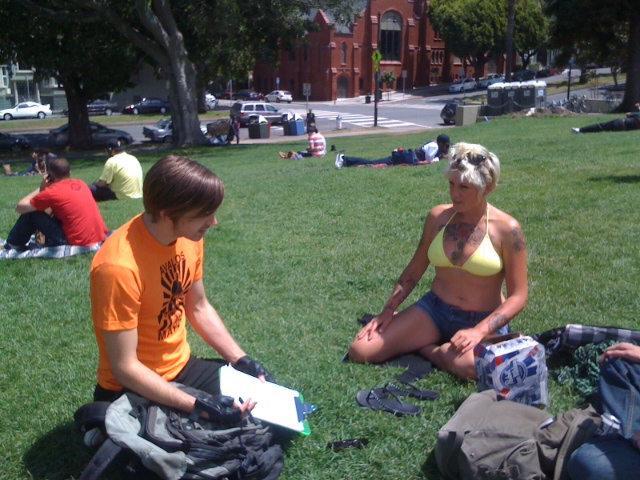Music listings are compiled by Cheryl Eddy. Since club life is unpredictable, it’s a good idea to call ahead to confirm bookings and hours. Prices are listed when provided to us. Submit items for the listings at listings@sfbg.com. For further information on how to submit items for the listings, see Picks.
WEDNESDAY 11
ROCK/BLUES/HIP-HOP
Bare Wires, Wrong Words, Tropical Sleep Café Du Nord. 9:30pm, $10.
Capt. Ahab, Bitches, Heavy Petting Hemlock Tavern. 9pm, $7.
Crown Point, Festizio, Hello Monster Hotel Utah. 9pm, $6.
Kills, Cold Cave, Entrance Band Fillmore. 8pm, $25.
Low Anthem, Daniel Lefkowitz Great American Music Hall. 8pm, $16.
Mummyshots, Burnt House, Rough Mix Bottom of the Hill. 9pm, $8.
Oh Sh**! Madrone Art Bar. 9:30pm, $5.
Pinback, Kenseth Thibideau Bimbo’s 365 Club. 8pm, $25.
*Sepultura, Belphegor, Hate, Keep of Kalessian, Neuraxis, Bonded By Blood Regency Ballroom. 7pm, $27.
Tommy and the High Pilots, Bird By Bird, Beta State Rickshaw Stop. 8pm, $10.
Uni and Her Ukelele 50 Mason Social House, 50 Mason, SF; www.50masonsocialhouse.com. 9pm.
Wammo vs. Forsythe Red Devil Lounge. 8pm, $10.
JAZZ/NEW MUSIC
Cosmo Alleycats Le Colonial, 20 Cosmo, SF; www.lecolonialsf.com. 7pm.
Dink Dink Dink, Gaucho, Michael Abraham Amnesia. 7pm, free.
Hobo Paradise Elbo Room. 9pm, $6.
Ben Marcato and the Mondo Combo Top of the Mark. 7:30pm, $10.
“Ondes: Water Songs” Meridian Gallery, 535 Powell, SF; www.meridiangallery.org. 7:30pm, $5-10. With Anne Bourne.
FOLK/WORLD/COUNTRY
Asleep at the Wheel Yoshi’s San Francisco. 8pm, $38.
Federico Aubele Independent. 9pm, $16.
DANCE CLUBS
Booty Call Q-Bar, 456 Castro, SF; www.bootycallwednesdays.com. 9pm. Juanita Moore hosts this dance party, featuring DJ Robot Hustle.
Cannonball Beauty Bar. 10pm, free. Rock, indie, and nu-disco with DJ White Mike.
Jam Fresh Wednesdays Vessel, 85 Campton, SF; (415) 433-8585. 9:30pm, free. With DJs Slick D, Chris Clouse, Rich Era, Don Lynch, and more spinning top 40, mash-ups, hip-hop, and remixes.
Mary-Go-Round Lookout, 3600 16th St, SF; (415) 431-0306. 10pm, $5. A weekly drag show with hosts Cookie Dough, Pollo Del Mar, and Suppositori Spelling.
No Room For Squares Som., 2925 16th St, SF; (415) 558-8521. 6-10pm, free. DJ Afrodite Shake spins jazz for happy hour.
Respect Wednesdays End Up. 10pm, $5. Rotating DJs Daddy Rolo, Young Fyah, Irie Dole, I-Vier, Sake One, Serg, and more spinning reggae, dancehall, roots, lovers rock, and mash-ups.
Synchronize Il Pirata, 2007 16th St, SF; (415) 626-2626. 10pm, free. Psychedelic dance music with DJs Helios, Gatto Matto, Psy Lotus, Intergalactoid, and guests.
THURSDAY 12
ROCK/BLUES/HIP-HOP
Cassian, DJ Aaron Axelsen, Miles the DJ Rickshaw Stop. 10pm.
Chuck Alvarez Band Biscuits and Blues. 8 and 10pm, $15.
Citizen Cope Independent. 8pm, $25.
Roger Clyne and the Peacemakers Slim’s. 8pm, $16.
Ezra Furman and the Harpoons, Tristen, Apache Relay Bottom of the Hill. 9pm, $12.
Hooks, Theo Logian Explosion, Angel and Robot Show Thee Parkside. 9pm, $6.
Joan of Arc, Air Waves Café Du Nord. 8pm, $14.
My Parade, Yes Gos, Lydia and Projects Hemlock Tavern. 9pm, $6.
Nazi Dust, Futur Skullz, Cardboard Funeral, Opt Out El Rio. 9pm, $7.
Rhymin’ and Stealin’, DJ Jamie Jams Knockout. 9:30pm, $8.
Young Dubliners Yoshi’s San Francisco. 8pm, $20.
JAZZ/NEW MUSIC
Cosmo Alleycats Blondie’s, 540 Valencia, SF; (415) 864-2419. 9pm, free.
Dave Parker Quartet Purple Onion, 140 Columbus, SF; (415) 956-1653. 8:30-11pm, free.
Organsm featuring Jim Gunderson and “Tender” Tim Shea Bollyhood Café. 6:30-9pm, free.
SF Jazz Hotplate Series Amnesia. 9pm.
Stompy Jones Top of the Mark. 7:30pm, $10.
FOLK/WORLD/COUNTRY
Savannah Blu Atlas Café. 8-10pm, free.
Sister Exister Café Royale, 800 Post, SF; (415) 641-6033. 8pm, free.
“Twang! Honky Tonk” Fiddler’s Green, 1330 Columbus, SF; www.twanghonkytonk.com. 5pm.
DANCE CLUBS
Afrolicious Elbo Room. 9:30pm, $5. DJs Pleasuremaker and Señor Oz, plus guest Black Mahal, spin Afrobeat, Tropicália, electro, samba, and funk.
Bike From Work Party DNA Lounge. 6-9pm, $5-10. Pedal over for DJs, a fashion show, and more with the San Francisco Bicycle Coalition.
CakeMIX SF Wish, 1539 Folsom, SF; www.wishsf.com. 10pm, free. DJ Carey Kopp spinning funk, soul, and hip-hop.
Caribbean Connection Little Baobab, 3388 19th St, SF; (415) 643-3558. 10pm, $3. DJ Stevie B and guests spin reggae, soca, zouk, reggaeton, and more.
Culture Corner Koko Cocktails, 1060 Geary, SF; www.kokococktails.com. 10pm, free. Roots reggae, dub, rocksteady, and classic dancehall with DJ Tomas, Yusuke, Vinnie Esparza, and Basshaka and ILWF.
Drop the Pressure Underground SF. 6-10pm, free. Electro, house, and datafunk highlight this weekly happy hour.
El Elle, LleGGs, Kit Clayton Public Works, 161 Erie, SF; www.publicsf.com. 9pm, $7.
Guilty Pleasures Gestalt, 3159 16th St, SF; (415) 560-0137. 9:30pm, free. DJ TophZilla, Rob Metal, DJ Stef, and Disco-D spin punk, metal, electro-funk, and 80s.
David J Cat Club. 9pm, $3-7. The Bauhaus-Love and Rockets veteran spins goth and more.
Jivin’ Dirty Disco Butter, 354 11th St., SF; (415) 863-5964. 8pm, free. With DJs spinning disco, funk, and classics.
Kissing Booth Make-Out Room. 9pm, free. DJs Jory, Commodore 69, and more spinning indie dance, disco, 80’s, and electro.
Mestiza Bollywood Café, 3376 19th St, SF; (415) 970-0362. 10pm, free. Showcasing progressive Latin and global beats with DJ Juan Data.
Motion Sickness Vertigo, 1160 Polk, SF; (415) 674-1278. 10pm, free. Genre-bending dance party with DJs Sneaky P, Public Frenemy, and D_Ro Cyclist.
1984 Mighty. 9pm, $2. The long-running New Wave and 80s party has a new venue, featuring video DJs Mark Andrus, Don Lynch, and celebrity guests.
Peaches Skylark, 10pm, free. With an all female DJ line up featuring Deeandroid, Lady Fingaz, That Girl, and Umami spinning hip-hop.
Thursday Special Tralala Revolution Café, 3248 22nd St, SF; (415) 642-0474. 5pm, free. Downtempo, hip-hop, and freestyle beats by Dr. Musco and Unbroken Circle MCs.
Tropicana Madrone Art Bar. 9pm, free. Salsa, cumbia, reggaeton, and more with DJs Don Bustamante, Apocolypto, Sr. Saen, Santero, and Mr. E.
FRIDAY 13
ROCK/BLUES/HIP-HOP
Black Angels, Sleepy Sun Slim’s. 9pm, $19.
Crown City Rockers Yoshi’s San Francisco. 10:30pm, $20.
Diesto, Prizehog, Attitude Problem Hemlock Tavern. 9:30pm, $7.
Dramarama, Interchangeable Hearts, Fort Wilson Riot Red Devil Lounge. 8pm, $18.
Aaron Glass and friends Elbo Room. 9:30pm, $10.
Hi-Rhythm Hustlers Verdi Club, 2424 Mariposa, SF; www.oldtimey.net. 10pm, $10.
Maus Haus, Bronze, Pow! Bottom of the Hill. 9:30pm, $10.
Charlie Musselwhite Biscuits and Blues. 8 and 10pm, $35.
Of Montreal, Painted Palms, Hunx and His Punx Fillmore. 9pm, $25.
Peter Bjorn and John, Bachelorette Great American Music Hall. 9pm, $26.
Roy Rogers and the Delta Rhythm Kings with Carlos Reyes Yoshi’s San Francisco. 8pm, $24.
Sheer Terror, Old Firm Casuals, Knife Fight, Massacre Time Thee Parkside. 9pm, $15.
Universal Thump, Rebecca Gates Amnesia. 7pm.
Emily Zuzik, Go South Make-Out Room. 7:30pm, $8.
JAZZ/NEW MUSIC
Black Market Jazz Orchestra Top of the Mark. 9pm, $10.
MegaFlame Big Band and the Bond Girls Café Du Nord. 9:30pm, $13.
FOLK/WORLD/COUNTRY
Antoine Dufour, Gareth Pearson, Ewan Dobson, Craig D’Andrea Swedish American Hall (upstairs from Café Du Nord). 8pm, $15.
Fell in a Well 50 Mason Social House, 50 Mason, SF; www.50masonsocialhouse.com. 9pm.
Femi Kuti and the Positive Force, DJ Harry Duncan Bimbo’s 365 Club. 9pm, $30.
DANCE CLUBS
Afro Bao Little Baobab, 3388 19th St, SF; (415) 643-3558. 10pm, $5. Afro and world music with rotating DJs including Stepwise, Steve, Claude, Santero, and Elembe.
Blow Up DNA Lounge. 10pm-2am, $20. Electro with Jeffrey Paradise, Tek Threat, and guests.
DJ Markangelo Medjool, 2522 Mission, SF; www.medjoolsf.com. 10:30pm, $10.
Exhale, Fridays Project One Gallery, 251 Rhode Island, SF; (415) 465-2129. 5pm, $5. Happy hour with art, fine food, and music with Vin Sol, King Most, DJ Centipede, and Shane King.
Fubar Fridays Butter, 354 11th St., SF; (415) 863-5964. 6pm, $5. With DJs spinning retro mashup remixes.
Go Go Mania Rickshaw Stop. 8pm, $10. Burlesque with the Devil-Ettes and others, plus live music by Deke Dickerson and the All Star Frat Band, Los Shimmy Shakers, Royal Deuces, DJ Howie Pyle, and MC Johnny “Chuckles” Bartlett.
Good Life Fridays Apartment 24, 440 Broadway, SF; (415) 989-3434. 10pm, $10. With DJ Brian spinning hip-hop, mash-ups, and top 40.
Heartical Roots Bollywood Café. 9pm, $5. Recession friendly reggae.
Hot Chocolate Milk. 9pm, $5. With DJs Big Fat Frog, Chardmo, DuseRock, and more spinning old and new school funk.
Indy Slash Amnesia. 10pm. With DJ Danny White.
M.O.M. Weekend Edition Madrone Art Bar. 10pm, $5. DJ Gordo Cabeza and guests spin and remix Motown.
Rockabilly Fridays Jay N Bee Club, 2736 20th St, SF; (415) 824-4190. 9pm, free. With DJs Rockin’ Raul, Oakie Oran, Sergio Iglesias, and Tanoa “Samoa Boy” spinning 50s and 60s Doo Wop, Rockabilly, Bop, Jive, and more.
Roller Disco Mighty. 9pm, $10. Tal M. Klein, Anthony Mansfield, and Carey Kopp spin at this four-wheeled disco party; skate rentals $5.
Some Thing Stud. 10pm, $7. VivvyAnne Forevermore, Glamamore, and DJ Down-E give you fierce drag shows and afterhours dancing.
Vintage Orson, 508 Fourth St, SF; (415) 777-1508. 5:30-11pm, free. DJ TophOne and guest spin jazzy beats for cocktalians.
SATURDAY 14
ROCK/BLUES/HIP-HOP
Beso Negro 50 Mason Social House, 50 Mason, SF; www.50masonsocialhouse.com. 9pm.
Hayes Carll, Romany Rye Slim’s. 9pm, $19.
Fingerpuppets O’Neill’s, 747 Third St, SF; www.fingerpuppetsrock.com. 10:30pm, free.
Greenhornes, Jeff the Brotherhood Bottom of the Hill. 10pm, $12.
High Tension Wires, Sharp Objects, Nix, Neighborhood Brats Rock-It Room. 9:30pm, $10.
John Lee Hooker Jr. Biscuits and Blues. 8 and 10pm, $22.
Stephen Kellogg, Tift Merritt Swedish American Hall (upstairs from Café Du Nord). 9:30pm, $12.
Live Evil Riptide Tavern. 9:45pm, free.
Magic! Magic Roses Amnesia. 7pm.
Man Man, Shilpa Ray and Her Happy Hookers Bimbo’s 365 Club. 9pm, $18.
“San Francisco OysterFest” Great Meadow, Fort Mason Center, Bay at Laguna, SF; www.sfoysterfest.com. 11am-7pm, $35-75. With Rodrigo Y Gabriela, Guster, Pepper, Tea Leaf Green, and more.
Shannon and the Clams, Apache, Uzi Rash Thee Parkside. 9pm, $8.
Soulive, Lettuce Fillmore. 9pm, $25.
Stripmall Architecture, Tremor Low, Excuses for Skipping Café Du Nord. 9:30pm, $12.
Thingers, Roabbles, Soft Bombs Hemlock Tavern. 9:30pm, $7.
JAZZ/NEW MUSIC
Freda Payne Yoshi’s San Francisco. 8pm, $30.
FOLK/WORLD/COUNTRY
Ostad Nejad and Shirzad Sharif Red Poppy Art House. 8pm, $10-15.
“Saturday Night Salsa” Ramp, 855 Terry Francois, SF; www.facebook.com/TheRampSF. 5:30-8:30pm, $10.
DANCE CLUBS
Afro Bao Little Baobab, 3388 19th St, SF; (415) 643-3558. 10pm, $5. Afro and world music with rotating DJs including Stepwise, Steve, Claude, Santero, and Elembe.
Bootie SF: DJs from Mars Tribute DNA Lounge. 9pm, $8-15. Mash-ups with Adrian and Mysterious D, plus guests.
Cockblock Rickshaw Stop. 10pm, $5-8. Queer dance party for dykes, lezzies, trannies, homos, and friends with DJs Natalie Nuxx and guests.
DJ Qbert Yoshi’s San Francisco. 10:30pm, $24. Champion turntablist.
Fire Ball: Nexus Burning Man Fundraiser 550 Barneveld, SF; www.nexusfireball.eventbrite.com. 9pm, $20. With Radio Hiro, Comma, R-Kidz of the Lawgiverz, Mancub, and more.
Fly Me to the Moon Koko Cocktails, 1060 Geary, SF; (415) 885-4788. 9:30pm. Sixties soul and girl groups with DJ Amy A and DJ the DJ.
Go Bang! Deco Lounge, 510 Larkin, SF; (415) 346 – 2025. 9pm, $5. Recreating the diversity and freedom of the 70’s/ 80’s disco nightlife with DJs Steve Fabus, Tres Lingerie, Sergio, and more.
Hot Flash Ruby Skye. 5-9pm, $15. With DJ Dirty Kurty.
HYP Club Eight, 1151 Folsom, SF; www.eightsf.com. 10pm, free. Gay and lesbian hip-hop party, featuring DJs spinning the newest in the top 40s hip-hop and hyphy.
Rock City Butter, 354 11th St., SF; (415) 863-5964. 6pm, $5 after 10pm. With DJs spinning party rock.
Same Sex Salsa and Swing Magnet, 4122 18th St, SF; (415) 305-8242. 7pm, free.
Smithsfits Friend Club Knockout. 9:30pm, $4. Smiths and Misfits with DJs Josh Ghoul and Jay Howell.
Spirit Fingers Sessions 330 Ritch. 9pm, free. With DJ Morse Code and live guest performances.
Spotlight Siberia, 314 11th St, SF; (415) 552-2100. 10pm. With DJs Slowpoke, Double Impact, and Moe1.
Synergy Medjool, 2522 Mission, SF; www.medjoolsf.com. 10:30pm, $20.
Tormenta Tropical Elbo Room. 10pm, $5-10. Electro cumbia with DJs Shawn Reynaldo and Oro 11.
Wolf + Lamb vs SoulClap Public Works, 161 Erie, SF; www.publicsf.com. 10pm, $20.
SUNDAY 15
ROCK/BLUES/HIP-HOP
“Battle of the Bands” DNA Lounge. 5:30pm, $12. With LuciGraw, Dawn Is Our Enemy, and others.
Beehavers, C-Horse, Waiting Room Hemlock Tavern. 9pm, $6.
Kim Boekbinder, Corpus Callosum Amnesia. 9pm, $7.
R. Stevie Moore, Tropical Ooze, Wet Illustrated Café Du Nord. 9pm, $12.
Lucky Peterson Biscuits and Blues. 8 and 10pm, $20.
San Francisco State University Gospel Choir Yoshi’s San Francisco. 7 and 9pm, $20.
Coty Simpson and Greyson Chance, Shane Harper, Camryn Great American Music Hall. 7pm, $18.
JAZZ/NEW MUSIC
Kurt Ribak, Sheilani Alix, and Tim Fox Bliss Bar, 4026 24th St, SF; www.blissbarsf.com. 4:30-7:30pm, $10.
“Strength for Japan” Cole Valley Fitness, 957 Cole, SF; (415) 665-3330. 4pm, free. Donations accepted to raise money for the Japan NGO Earthquake Relief and Recovery Fund; performers include Noertker’s Moxie with special guest Motoko Honda.
“Sunday Sessions” Madrone Art Bar. 9pm. With Wil Blades.
Tom Lander Duo Medjool, 2522 Mission, SF; www.medjoolsf.com. 6-9pm, free.
FOLK/WORLD/COUNTRY
Bay Area Youth Harp Ensemble, Triskela St. Mary’s Cathedral, 1111 Gough, SF; www.multiculturalmusicfellowship.org. 3:30pm, $10-20.
Meredith Monk and Kitka Jewish Community Center of San Francisco, Kanbar Hall, 3200 California, SF; (415) 292-1233. 7pm, $32-41.
Sea Dramas Thee Parkside. 4pm, free.
“Sunday Night Latin Sounds” Ramp, 855 Terry Francois, SF; www.facebook.com/TheRampSF. 5:30-8:30pm, $7.
Vieux Farka Toure, Bhi Bhiman Independent. 8pm, $15.
“A Very Folky SeaweedSway Showcase” Make-Out Room. 7:30pm, $7. With Winnie Byrd, Lindsay Clark, Ed Masuga, and more.
DANCE CLUBS
Batcave Cat Club. 10pm, $5. Death rock, goth, and post-punk with Steeplerot Necromos and c_death.
Dub Mission Elbo Room. 9pm, $10. Dub, roots, and classic dancehall with Poirier and DJ Sep.
Gloss Sundays Trigger, 2344 Market, SF; (415) 551-CLUB. 7pm. With DJ Hawthorne spinning house, funk, soul, retro, and disco.
Honey Soundsystem Paradise Lounge. 8pm-2am. “Dance floor for dancers – sound system for lovers.” Got that?
La Pachanga Blue Macaw, 2565 Mission, SF; www.thebluemacawsf.com. 6pm, $10. Salsa dance party with live Afro-Cuban salsa bands.
MONDAY 16
JAZZ/NEW MUSIC
Death Set, Win Win Rickshaw Stop. 8pm, $10.
Eisley, Narrative, Christie Dupree Slim’s. 8pm, $16.
Eric Himan, Namoli Brennet El Rio. 7pm, $5.
Melvins Great American Music Hall. 9pm, $22.50.
*Midnight, Saviours, Lightning Swords of Death, Archons Elbo Room. 9pm, $10.
Lucky Peterson Biscuits and Blues. 8 and 10pm, $20.
DANCE CLUBS
Death Guild DNA Lounge. 9:30pm, $3-5. Gothic, industrial, and synthpop with Joe Radio, Decay, and Melting Girl.
Krazy Mondays Beauty Bar. 10pm, free. With DJs Ant-1, $ir-Tipp, Ruby Red I, Lo, and Gelo spinning hip-hop.
M.O.M. Madrone Art Bar. 6pm, free. DJs Timoteo Gigante, Gordo Cabeza, and Chris Phlek playing all Motown every Monday.
Network Mondays Azul Lounge, One Tillman Pl, SF; www.inhousetalent.com. 9pm, $5. Hip-hop, R&B, and spoken word open mic, plus featured performers.
Sausage Party Rosamunde Sausage Grill, 2832 Mission, SF; (415) 970-9015. 6:30-9:30pm, free. DJ Dandy Dixon spins vintage rock, R&B, global beats, funk, and disco at this happy hour sausage-shack gig.
Skylarking Skylark. 10pm, free. With resident DJs I & I Vibration, Beatnok, and Mr. Lucky and weekly guest DJs.
TUESDAY 17
ROCK/BLUES/HIP-HOP
Awolnation, Epilogues, Afghan Raiders, Finish Ticket, DJ Aaron Axelsen Rickshaw Stop. 7:30pm, $10.53.
Bestial Mouths, Ssleeping Desiress, Ezra Buchla, John Mannion Amnesia. 9:30pm, $6.
Buffalo Tom, Heavenly States Slim’s. 8pm, $21.
Johnny Flynn and the Sussex Wit Independent. 8pm, $15.
Knickerbocker Blues Band 50 Mason Social House, 50 Mason, SF; www.50masonsocialhouse.com. 9pm.
Liquid Indian, Ava Mendoza, Gruesome Energy Hemlock Tavern. 9pm, $6.
Melvins Great American Music Hall. 9pm, $22.50.
Joe Pug, Strand of Oaks, Garrett Pierce Bottom of the Hill. 9pm, $10.
Quartet Rouge, Jesse Brewster, Rich Armstrong John Colins, 138 Minna, SF; www.johncolins.com. 9pm, free.
Steppin’ Madrone Art Bar. 9:30pm, $2.
JL Stiles, Paper Dolls, Meredith Axelrod Café Du Nord. 8pm, $10.
JAZZ/NEW MUSIC
Herb Alpert and Lani Hall Palace of Fine Arts, 3301 Lyon, SF; www.ticketmaster.com. 8pm, $57.50.
Bill Charlap Trio Yoshi’s San Francisco. 8pm, $25.
DANCE CLUBS
Brazilian Wax Elbo Room. 9pm, $7. DJs Carioca and P-Shot spin samba.
Eclectic Company Skylark, 9pm, free. DJs Tones and Jaybee spin old school hip-hop, bass, dub, glitch, and electro.
Share the Love Trigger, 2344 Market, SF; (415) 551-CLUB. 5pm, free. With DJ Pam Hubbuck spinning house.

